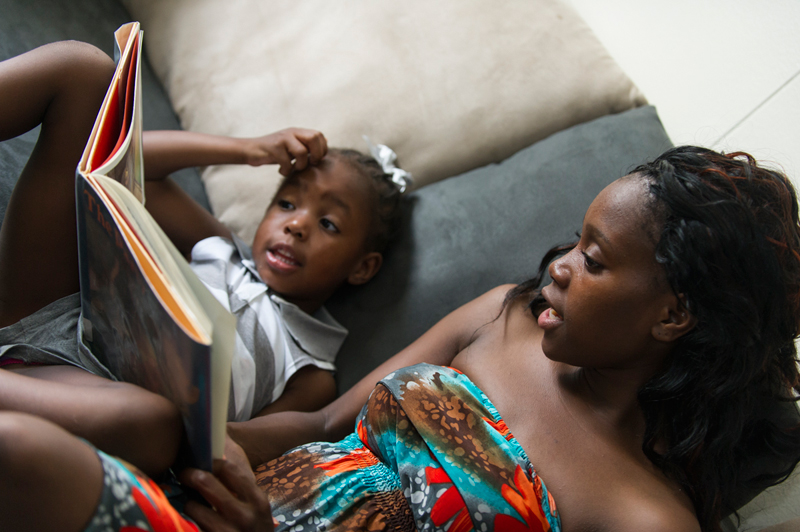Q & A with Dr. Pamela High: Should reading be part of a checkup with the pediatrician?
Not all babies will attend day care or preschool, but sooner or later, just about every kid visits the doctor. So if you have a message you want the parents of all young children to hear, turn to your local pediatrician to deliver it.
That’s the logic behind the recruitment of pediatricians in Hillary Clinton’s Too Small to Failcampaign urging parents to read, talk and sing to their babies from infancy onward. And recently, as the publisher Scholastic donated a half-million books for distribution in pediatricians’ offices nationwide, the Illinois-based American Academy of Pediatrics released its first early literacy policy.

Four-year-old Alona Sharp reads with her mother, Aneisha Newell, in Chicago. (Photo: Kim Palmer)
The organization is asking its 62,000 member doctors nationwide to educate parents about the well-documented benefits of reading on early brain development, as well as the emotional connection reading fosters between children and their caregivers. Pediatricians are also being urged to incorporate reading into office checkups.
The Hechinger Report spoke with Dr. Pamela High, who wrote the policy for the AAP. High directs the division of developmental-behavioral pediatrics at Hasbro Children’s Hospital, the principal teaching hospital of Brown University’s Alpert Medical School in Rhode Island.
Q: What prompted this action?
“We recommend that the book be not the candy at the end of the appointment but rather be an essential component of playing with the child and examining the child.” Dr. Pamela High, American Academy of Pediatrics
A: Our science has expanded a great deal in the last 10 or 20 years, so that we realize that it’s not just the genetics that a particular individual is born with, but the environment that makes a big difference in a child’s development over time…Perhaps the most important [environmental factor] is the relationship between parents and children, and ways of promoting those relationships are ones we need to pay more attention to. I really believe that early literacy is one of those ways. One of the reasons reading to children is so powerful is it’s often a one-on-one experience between parents and children where children have your full attention. With high-quality books, it can be a language-enriching experience. It’s also a reassuring, comforting kind of routine for parents and children to spend together that nurtures the relationship that’s so important to the life course.
Q: To what extent are pediatricians already urging parents to read to their children, and how common is it for reading to be a part of routine checkups, as you are recommending?
A: From the perspective of the academy, this is the first time that literacy promotion has been called out as an essential component of primary care. This is not a rewrite of an old policy statement…[While reading has been encouraged previously], this is codifying it in one place and providing the Q & A with Dr. Pamela High: Should reading be part of a checkup with the pediatrician? | Hechinger Report:
